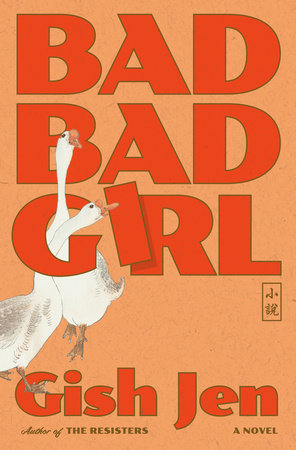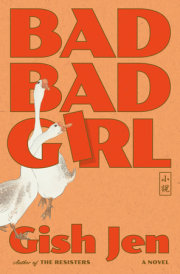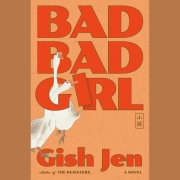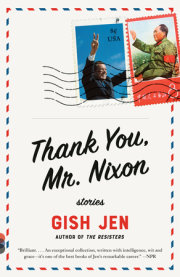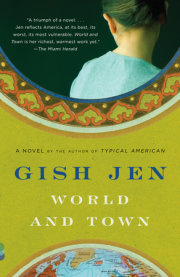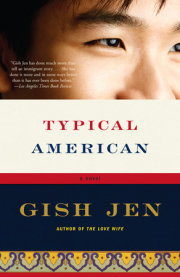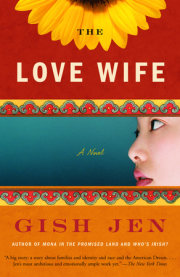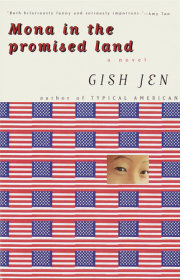“The story of what it means to be American in an era of sweeping demographic change enlarges Bad Bad Girl, sweetened by comic touches and a final note of grace.” —Hamilton Cain, Washington Post
“Trigger warning for any daughter who has ever had a fraught relationship with their mother: Bad Bad Girl may prompt a flood of feelings not felt since adolescence. . . . A heart-piercingly personal work that also imparts universal truths about the immigrant experience—and what it is to be a daughter, a mother and a woman. . . . Suffused with love and a desire to finally understand. . . . How rich this book is, and how humane. . . . A marvel.” —Los Angeles Times
“Moving and healing.” —Boston Globe
“Funny, sad and poignant.” —People
“A gimlet-eyed account of a difficult mother-daughter relationship. . . . Jen has applied [her] candid but big-hearted style once described by Fresh Air’s Maureen Corrigan as ‘Frank Capra-esque’ to one of the central dramas of her own life.” —Colin Dwyer, NPR.org
"A poignant, genre-bending novel. . . . Inventive, empathetic.” —San Francisco Chronicle
“What an amazing f***ing novel, wild like love and twice as revealing. Gish Jen has written the multigenerational mother-daughter epic of our new century. Bad Bad Girl spans decades, oceans, continents, generations, languages, showing us we can escape almost anything—except the voices of our parents. Intergenerational mother-daughter mayhem of the absolute best smartest vexing most moving kind.” —Junot Díaz, author of The Brief Wondrous Life of Oscar Wao
“An unsentimental, insightful, and brutally honest account of Chinese family relationships, in China and the West.” —Jung Chang, author of Wild Swans
“The difference between the mother we had and the mother we may have wanted is at the heart of Gish Jen’s novel-cum-memoir. . . . Her compassion for Agnes is as voluminous as her hurt. Families are spaces of burning complexity, parents are ever flawed, ever human, grappling with their private heartbreaks. This book is not a forgiveness, but an acknowledgment that it was hard.” —Diana Evans, Financial Times
★ “Astute and revelatory.” —Publishers Weekly (starred)
★ "As portraits of tough mother-daughter relationships go, it’s as moving as they come.” —Kirkus Reviews (starred)
★ “Heartbreaking and stunning.” —Library Journal (starred)
★ “A uniquely faceted, cross-cultural mother-daughter drama of anguish, fracture, determination, humor, loyalty, and love. . . . Ravishingly vivid.” —Booklist (starred)
★ “Standout. . . . What makes Bad Bad Girl a pleasure is the deft plotting and the sympathetic portraits of the main characters, even when they’re behaving their worst. It’s one of the best tales of mother-daughter relationships you’ll encounter.” —BookPage (starred)
★ “Singular. . . . Extraordinary. . . . Strikingly authentic. . . . Both deeply personal and universally resonant. . . . This book is imperative for anyone interested in immigrant experiences, the complexities of family, and the art of writing personal history.” —Shelf Awareness (starred)
“Gish Jen is the absolute master of extremely funny devastation.” —LitHub
“A stunningly executed genre-bending book. . . . Forthright and profound. . . . Because of [Jen’s] courage, Bad Bad Girl is an extraordinary book.” —Carol Iaciofano Aucoin, WBUR
“Playful, witty. . . . Jen imagines her mother as a young woman full of dreams, with a rich inner life, who approached the world with awe. . . . In the novel’s closing pages, the writer’s grief—not only for her dead mother, but for the relationship they never had—erupts on the page. . . . Strikingly poignant.” —Rhoda Kwan, Times Literary Supplement
“Unflinching yet compassionate. . . . Courageous and brimming with emotional intelligence. . . . She spans continents and decades without ever losing sight of the beating hearts at the story’s center.” —Kaitlin Jefferys, Voice Magazine (U.K.)
“Reading Bad Bad Girl, I felt a deep ache for mothers and daughters divided by culture and silence. Gish Jen writes tenderly about a woman carrying old China in her bones while raising a child in America. This story shows how quiet courage can be, and how a ‘bad girl’ is often just a woman who refuses to vanish. Many will find comfort and recognition in these pages.” —Xinran Xue, author of The Good Women of China
“A tender, poignant family history, laced with sharp insight and quiet humour. Bad Bad Girl is not just the story of women who journeyed from the old world to the new, but also of the luminous, deeply personal world they carried within.” —Yan Ge, author of Strange Beasts of China

